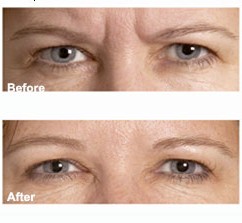My wife has been having jaw pain and migraines. We took her to the dentist because we’ve heard that can be TMJ disorder. The dentist checked her over and suggested Botox. That sort of threw me because I thought that was a cosmetic procedure. Will that actually help her?
Karl
Dear Karl,

I am glad you wrote and believe I can help clear some things up here. If you look at the image above, you can see in the top (before) image, the woman looks angry. In truth, it was the constant tension in her forehead muscles that were causing her muscles to cramp up like that.
Using Botox relaxes those muscles and gives her a less angry appearance, as you can see in the after image. This is the principle behind using Botox for TMJ disorder.
The same medication used for cosmetic purposes can serve a three-fold purpose. The smoothing out of the face is a side benefit for your wife. What she is really after is the way it releases the tense muscles. This will relieve the pressure on her jaw joint, which will help with her TMJ disorder. TMJ disorder can cause migraines. So, three birds with one stone. There is another use your wife probably doesn’t need, but I will mention it here for other readers. It can also help with gummy smiles.
You will still want to get to the bottom of what is causing her TMJ. Many times if it is a tension issue, you may find that your wife grinds or clenches her teeth. She may not even realize she does it because those types of habits are often done during sleep.
One thing that can help with that is a nightguard. It is like a sports guard but custom-fitted to her jaw so it will be very comfortable. The Botox will give her immediate relief. The night guard will help protect her teeth, at night, from any grinding and absorb some pressure from any clenching.
This blog is brought to you by Lafayette, LA Dentists Drs. Foreman and Thimmesch.